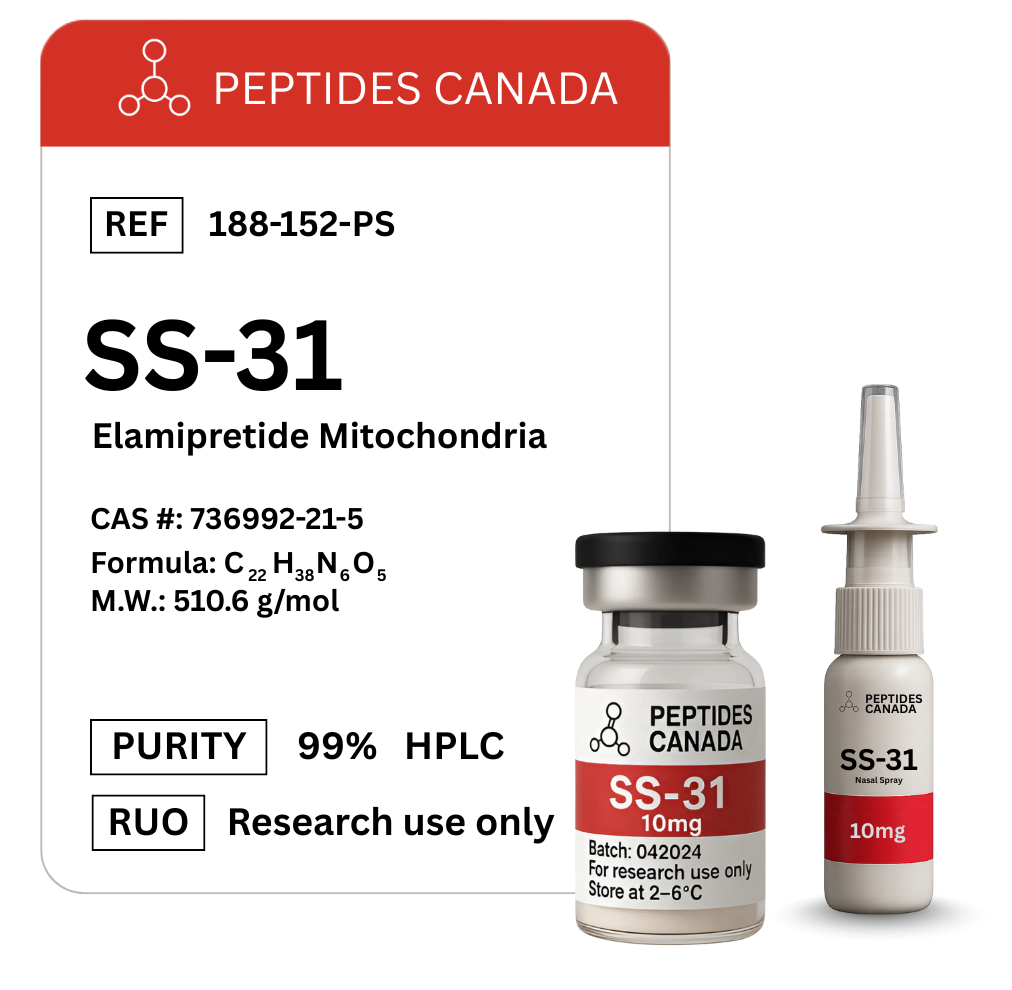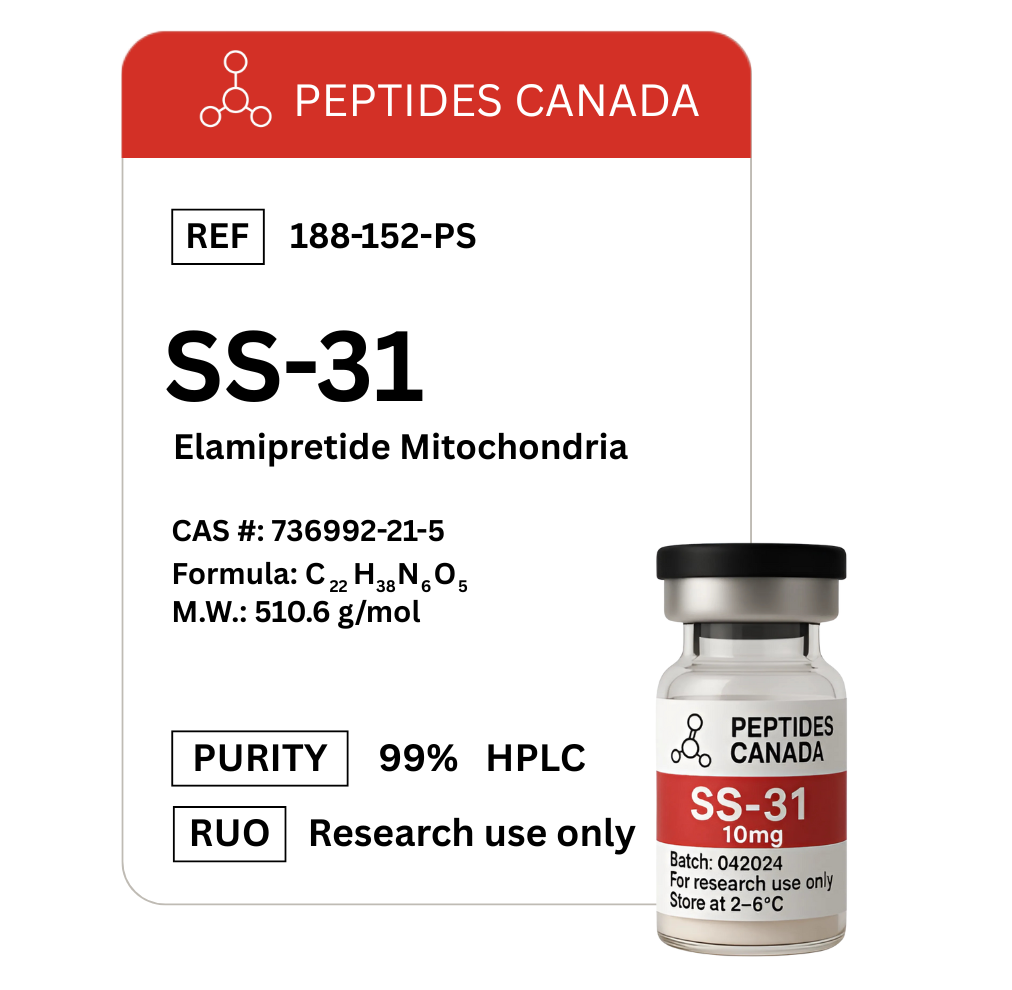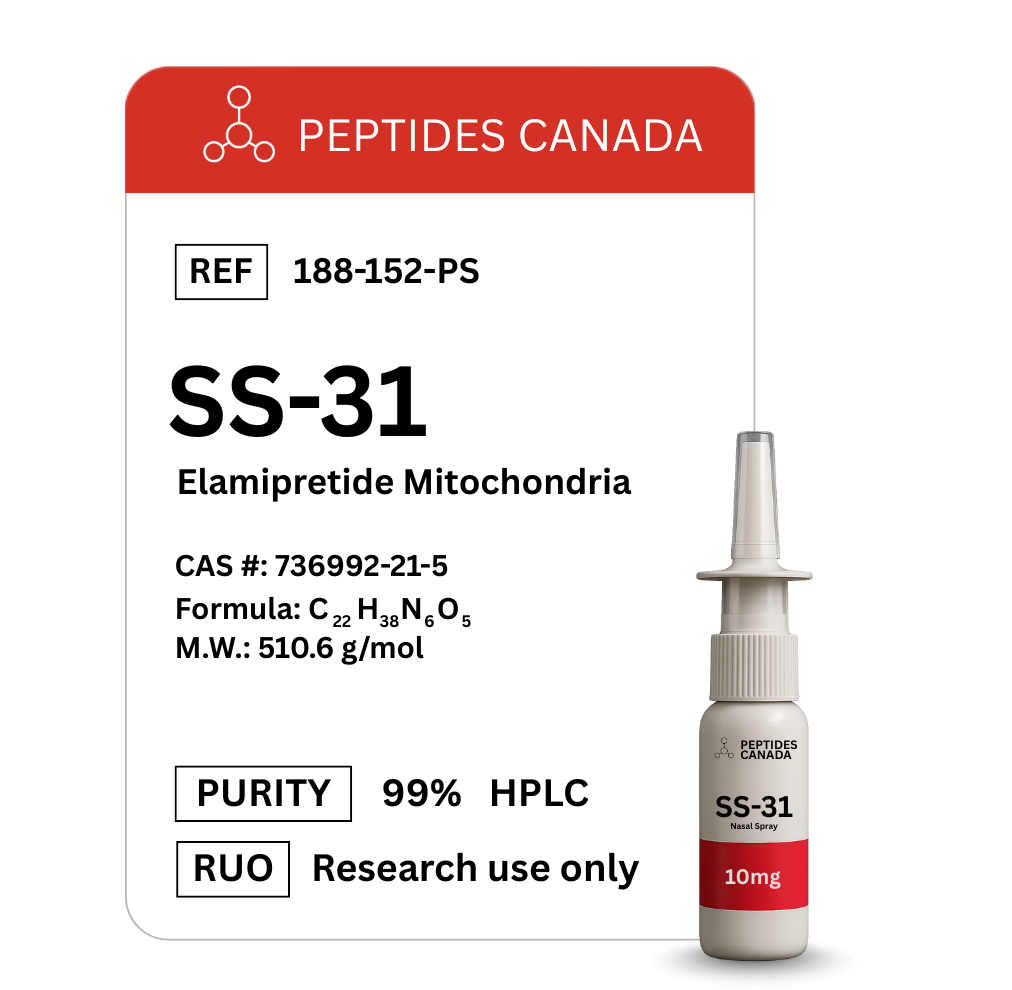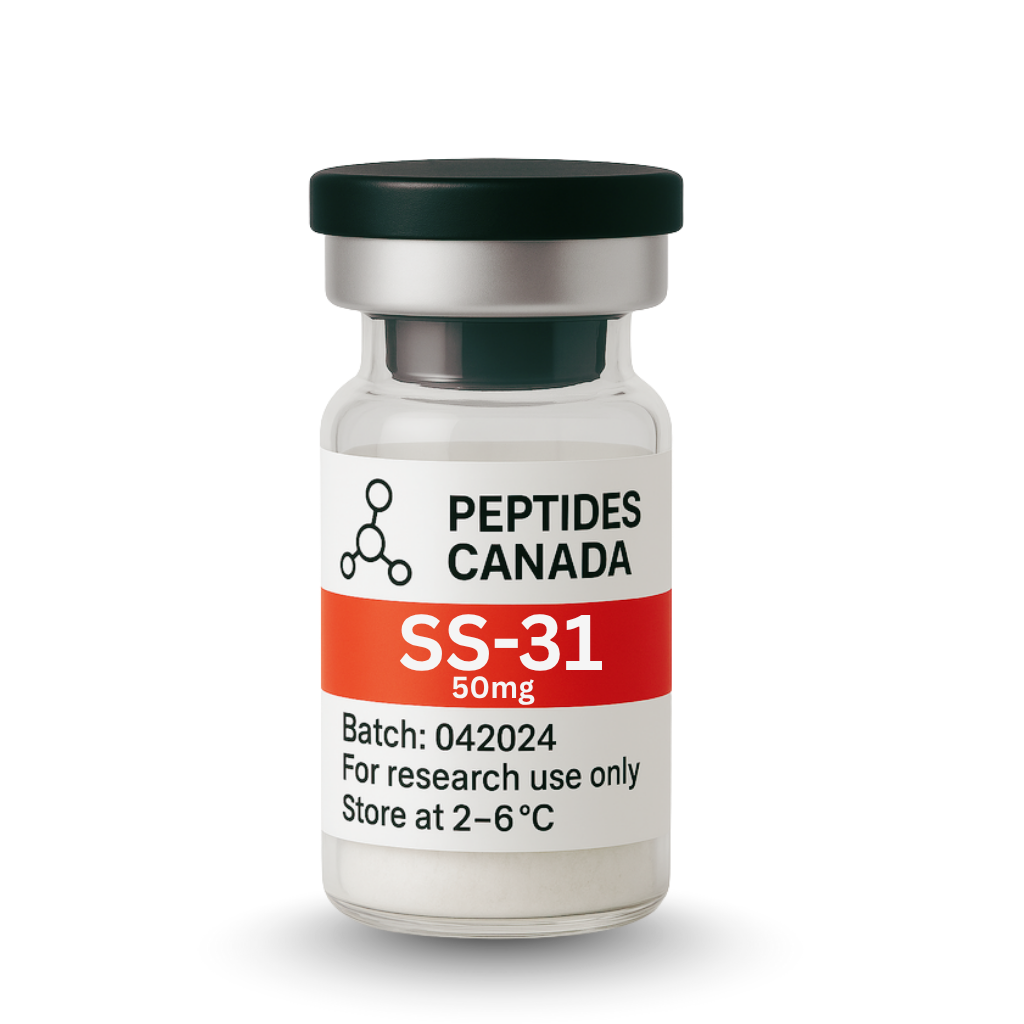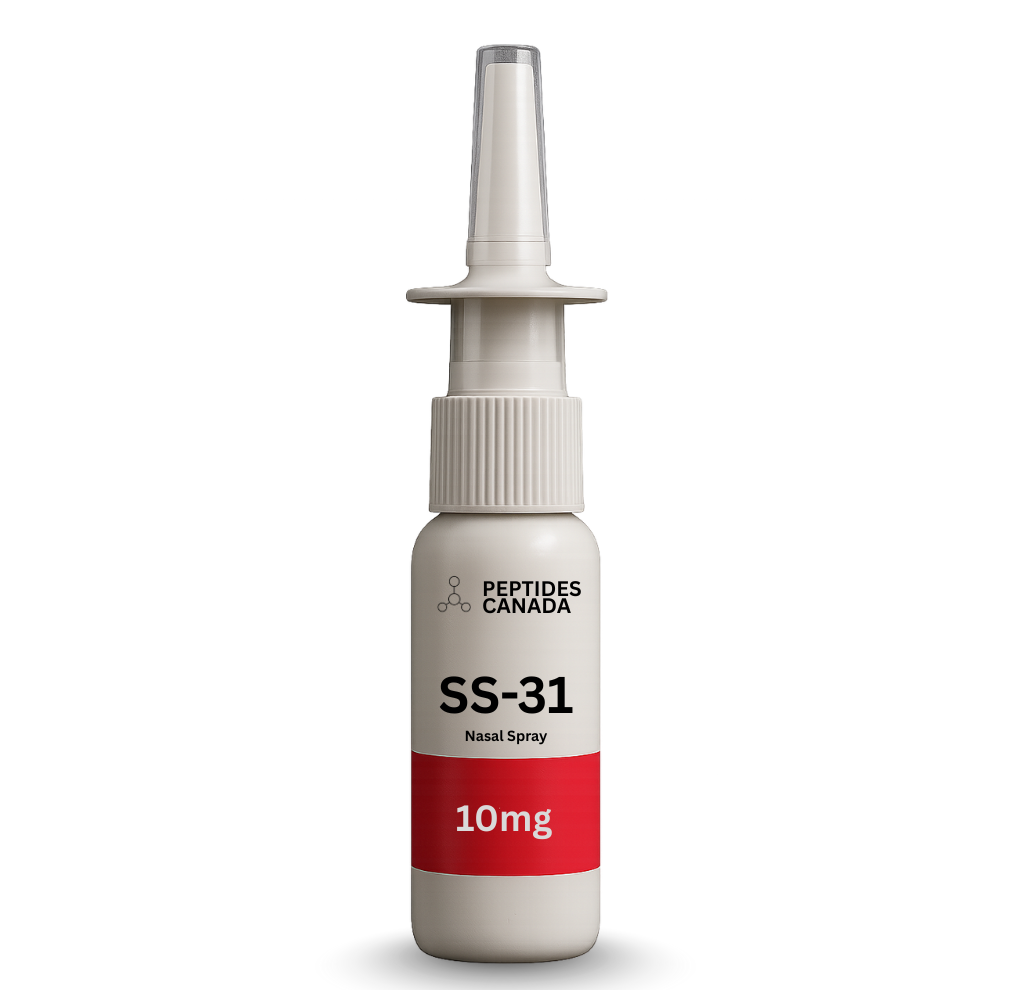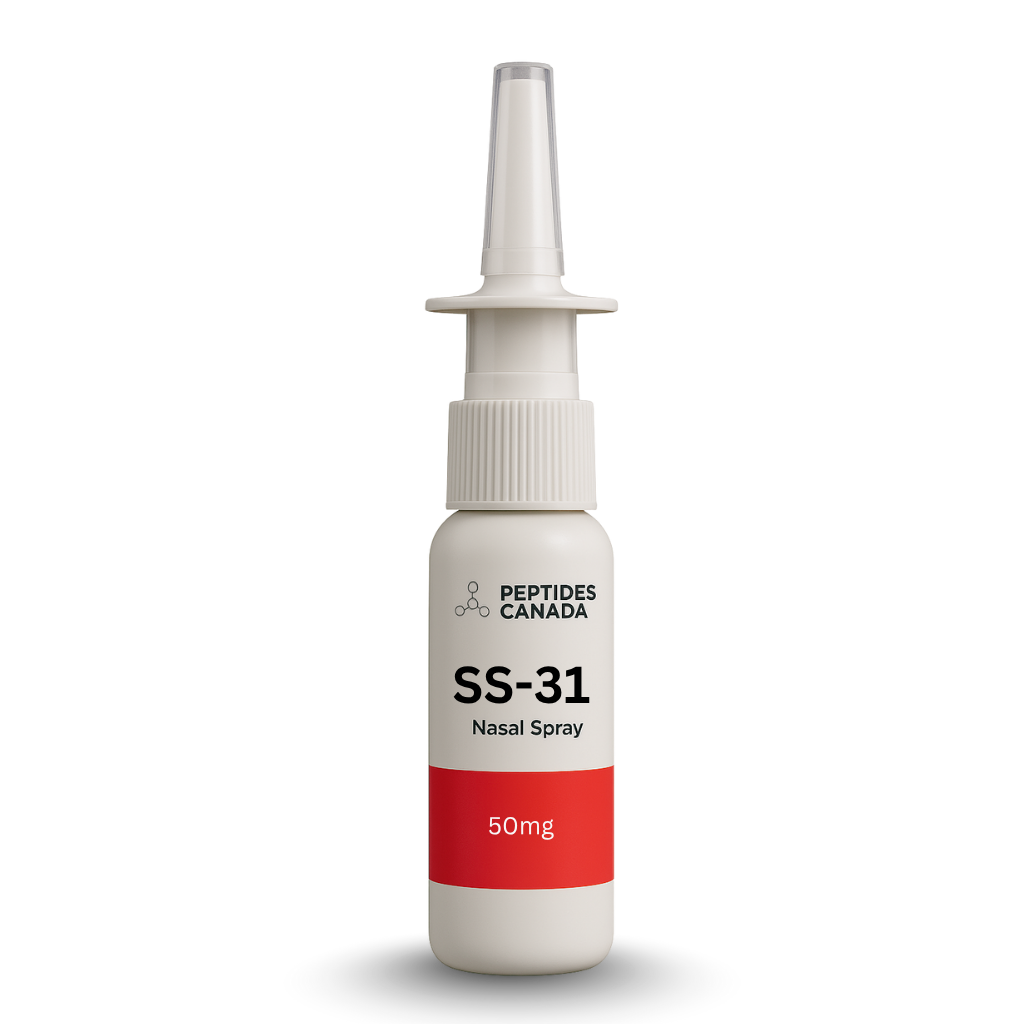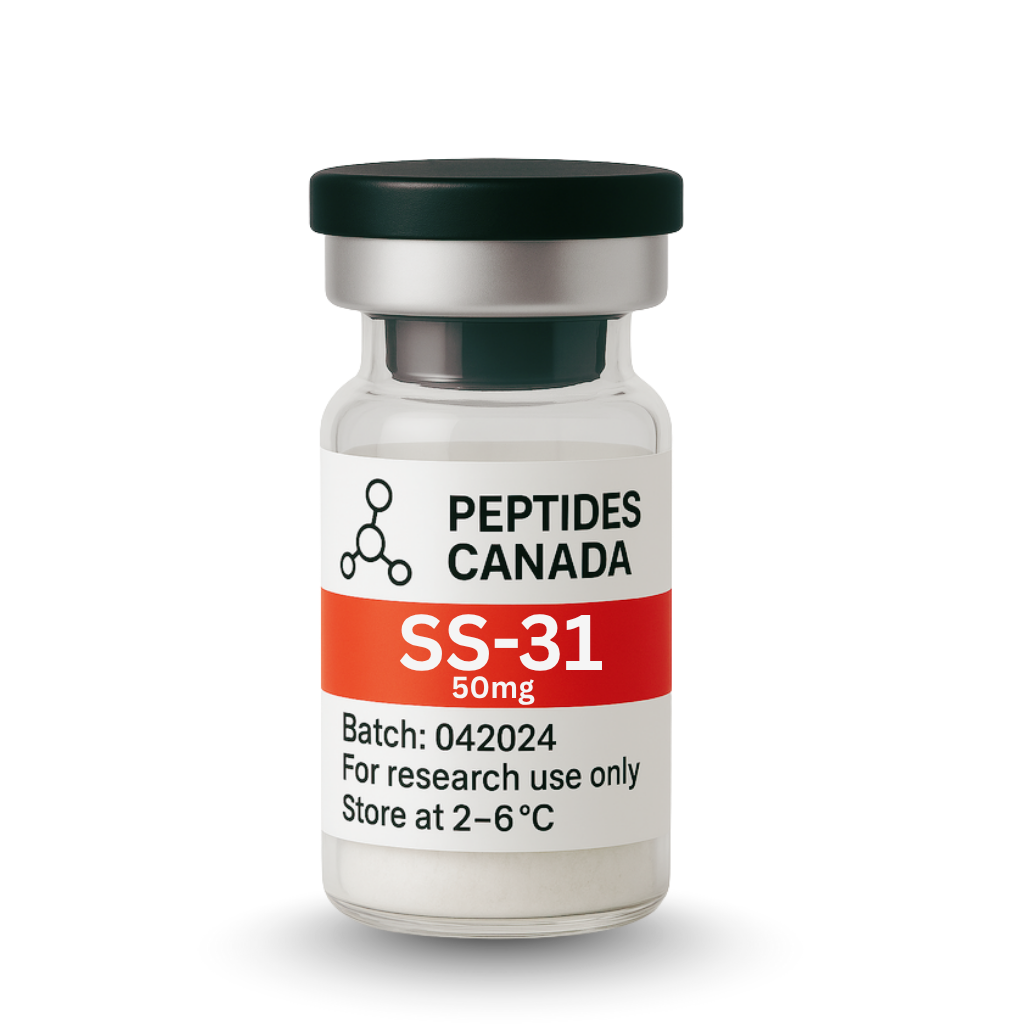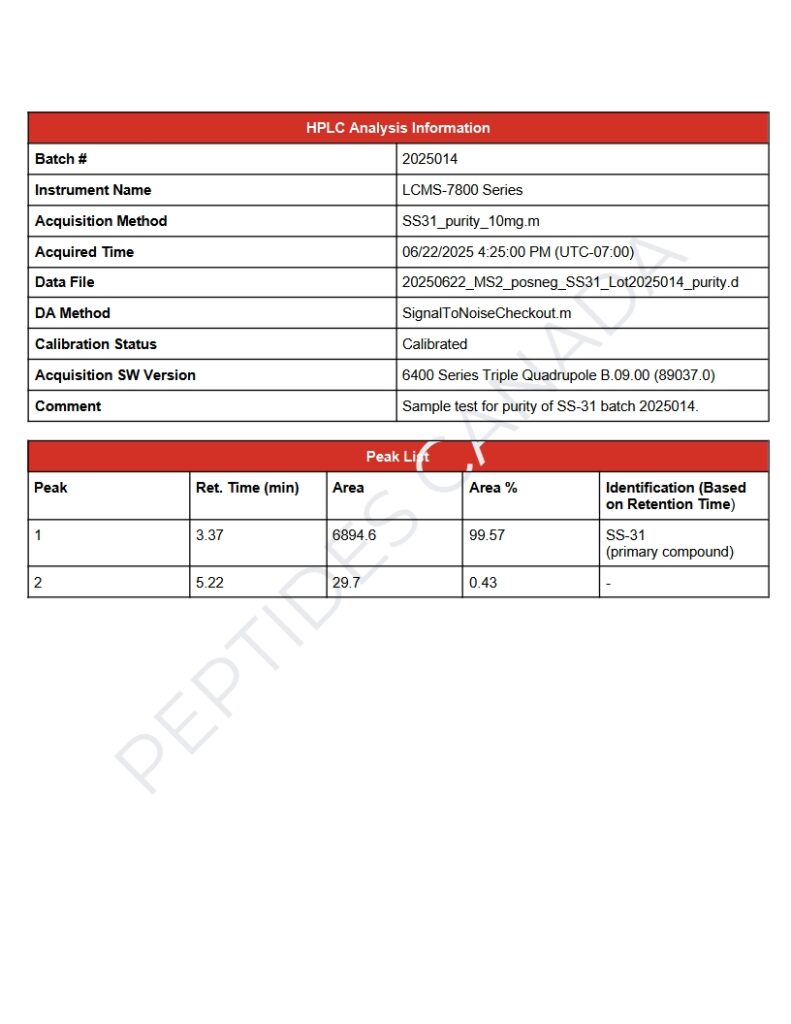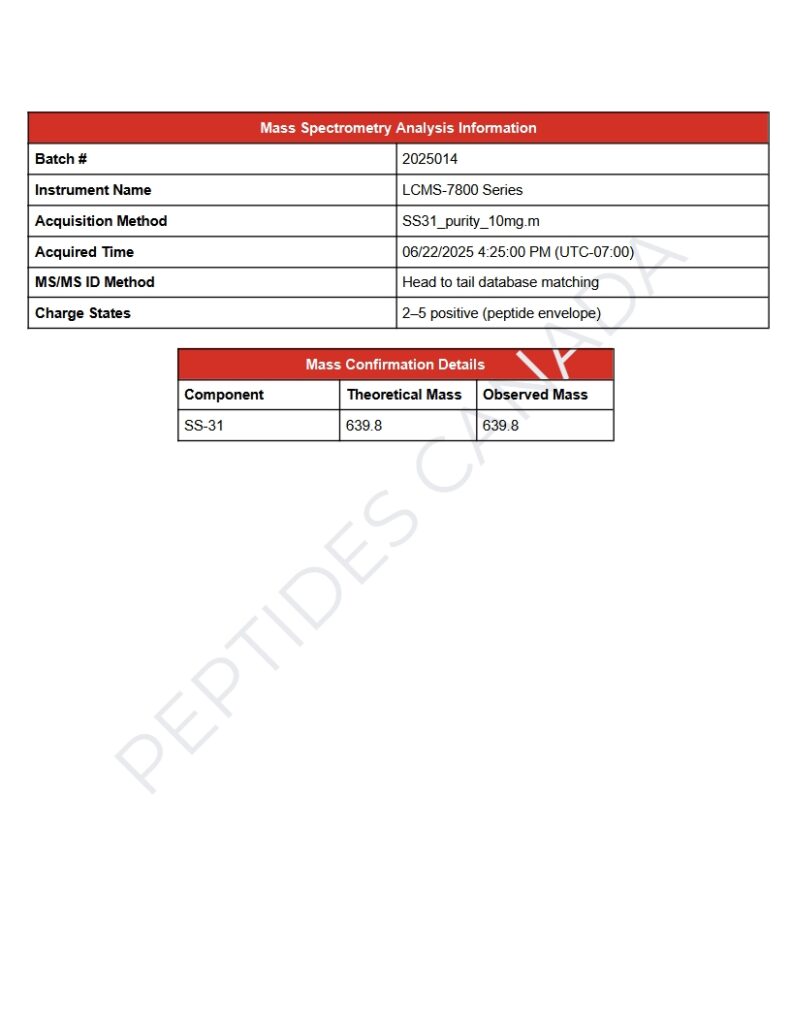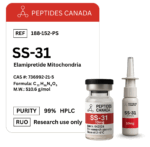
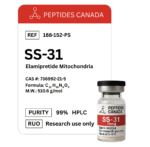

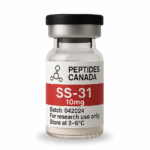
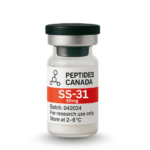
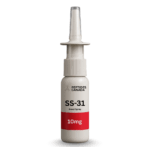
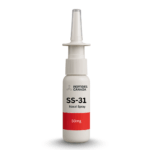


SS-31
From CAD $95 CAD $380
TESTED FOR:
- PURITY
- STERILITY
- WEIGHT
- ENDOTOXINS(LPS)
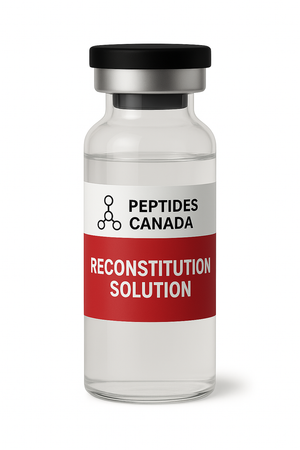
Free Reconstitution solution automatically added to your cart with each order of vial.
This product is Made, Tested & Shipped From Canada.
Ships Today
Order by 1:00 PM EST
Free Shipping
For 2 or more vials

99%+ Purity Guaranteed

COA Verified+

Trackable Shipping
SS-31 Peptide – 10mg
SS-31 (also known as Elamipretide) is a synthetic tetrapeptide with high affinity for mitochondrial membranes. It has been studied extensively for its ability to selectively target cardiolipin, a phospholipid unique to the inner mitochondrial membrane, and is of interest in research investigating oxidative stress, mitochondrial dysfunction, and age-related cellular decline.
Overview
SS-31 is designed to penetrate mitochondrial membranes and bind to cardiolipin, where it may stabilize mitochondrial cristae architecture, reduce reactive oxygen species (ROS) production, and optimize ATP synthesis. Unlike many antioxidants, SS-31 does not act as a free radical scavenger but instead modifies electron transport chain efficiency by supporting mitochondrial integrity.
Research suggests SS-31 may exert beneficial effects in models of neurodegeneration, cardiovascular disease, skeletal muscle atrophy, and ischemia-reperfusion injury. Its small size and cationic, aromatic-rich structure (D-Arg-Dmt-Lys-Phe-NH2) facilitate rapid uptake into mitochondria across a variety of cell types.
Chemical Makeup
- Molecular Formula: C22H38N6O5
- Molecular Weight: 510.6 g/mol
- Amino Acid Sequence: D-Arg-Dmt-Lys-Phe-NH2 (Dmt = 2′,6′-dimethyltyrosine)
- Other Known Titles: Elamipretide, MTP-131, Bendavia
Research and Clinical Studies
Mitochondrial Function and Oxidative Stress
Studies demonstrate SS-31’s ability to improve mitochondrial efficiency, reduce ROS generation, and stabilize electron transport chain function. In animal models, it has been shown to preserve ATP levels and reduce oxidative damage to mitochondrial proteins and lipids.
Cardiovascular Research
SS-31 has been evaluated in ischemia-reperfusion injury models, where it improved myocardial cell survival, preserved left ventricular function, and reduced infarct size. It has also been studied in heart failure models, demonstrating enhanced mitochondrial respiration and reduced cardiomyocyte apoptosis.
Neuroprotection
In preclinical models of neurodegenerative disease, SS-31 treatment was associated with improved neuronal survival, synaptic function, and cognitive performance. Its mitochondrial-targeted action is being explored for potential therapeutic applications in Alzheimer’s disease and Parkinson’s disease research.
Skeletal Muscle and Aging
Animal studies indicate SS-31 improves mitochondrial coupling and exercise tolerance in aged skeletal muscle, with reductions in muscle fatigue and oxidative stress markers.
Kidney and Liver Models
SS-31 has been shown to protect against renal and hepatic ischemia-reperfusion injury by preserving mitochondrial structure and reducing tissue damage.
SS-31 peptide is available for research and laboratory purposes only. Not for human consumption.
References
- Szeto HH. First-in-class cardiolipin therapeutic peptide to restore mitochondrial bioenergetics. Br J Pharmacol. 2014;171(8):2029–2050. https://pubmed.ncbi.nlm.nih.gov/24117165/
- Birk AV, et al. The mitochondrial-targeted compound SS-31 re-energizes ischemic mitochondria by interacting with cardiolipin. J Am Soc Nephrol. 2013;24(8):1250–1261. https://pubmed.ncbi.nlm.nih.gov/23766545/
- Zhao K, et al. A novel peptide antioxidant, SS-31, targets mitochondrial inner membrane cardiolipin. Free Radic Biol Med. 2004;36(12):1656–1667. https://pubmed.ncbi.nlm.nih.gov/15182853/
- Szeto HH, et al. Elamipretide (SS-31) improves mitochondrial bioenergetics and cardiac performance. J Mol Cell Cardiol. 2011;52(1):88–97. https://pubmed.ncbi.nlm.nih.gov/21967812/
- Manczak M, et al. Mitochondria-targeted antioxidant SS-31 reduces amyloid beta toxicity in Alzheimer’s disease models. Hum Mol Genet. 2010;19(11):1952–1964. https://pubmed.ncbi.nlm.nih.gov/20176672/
- Campbell MD, et al. SS-31 restores skeletal muscle mitochondrial coupling and improves exercise tolerance in aged mice. Aging Cell. 2019;18(3):e12915. https://pubmed.ncbi.nlm.nih.gov/30907784/
- Szeto HH, et al. SS peptides protect mitochondria from oxidative stress and cell death. Free Radic Biol Med. 2011;50(6):720–729. https://pubmed.ncbi.nlm.nih.gov/21172428/
- Birk AV, Szeto HH. Mitochondrial-targeted antioxidants: strategies for neuroprotection. Pharmacol Ther. 2011;131(1):33–40. https://pubmed.ncbi.nlm.nih.gov/21334385/
- Brown DA, et al. Reduction of oxidative damage to mitochondria by SS-31 peptide. Free Radic Biol Med. 2008;45(3):299–306. https://pubmed.ncbi.nlm.nih.gov/18482700/
- Kloner RA, et al. Elamipretide for ischemia/reperfusion injury: a mitochondrial therapeutic approach. Cardiovasc Drugs Ther. 2015;29(6):501–508. https://pubmed.ncbi.nlm.nih.gov/26494551/

HIGHEST QUALITY PEPTIDES
Our products are scientifically formulated and manufactured in cGMP-compliant facilities.

FAST DELIVERY
Enjoy fast and reliable 3–5 day shipping.

Dedicated Customer Service
Our customer service team is highly knowledgeable in peptide research and its applications. We’re available 24/7 to assist you.

Tested. Verified. Trusted.
We take a laboratory-first approach to quality. Each batch is made under controlled conditions and verified by an independent lab (HPLC/MS). We only ship batches that test ≥99% purity, and we provide a full COA, including identity, methods, and chromatograms, for your review.
See the Process for Yourself
We make our peptides in our own cGMP lab. Watch the video to see how every vial is produced, tested, and handled with care.
Science Behind Our Peptides
A clear explanation of how our peptides work, their benefits, why quality matters for best results, and what you should know.
Categories
Categories
How do I know the peptides I order are exactly what the label says?
Every vial we sell comes from a lab that follows current Good Manufacturing Practices (cGMP). That means each step of production is documented and controlled. Before a batch is released, it’s tested by independent third-party labs for purity, identity, and sterility. Certificates of analysis are available so you can see the exact test results.
Are your peptides produced in a sterile and controlled environment?
Yes. The labs we work with use ISO-certified clean rooms where air quality, equipment, and handling procedures are tightly regulated. Staff are trained to pharmaceutical-grade standards. This ensures the peptides are produced in an environment that minimizes contamination risks.
What about shipping? Do the peptides remain stable in transit?
Peptides in lyophilized (freeze-dried) form are stable at room temperature for transport. Once you receive them, refrigeration is recommended to maintain long-term integrity. We package every order securely to prevent damage and ship promptly, so your vials arrive in optimal condition.
How do I know you actually make these peptides yourselves?
We operate under strict in-house protocols that follow current Good Manufacturing Practices (cGMP). That means our team oversees the entire process from sourcing raw amino acids to the final lyophilized vial. Nothing is outsourced or repackaged. This gives us full control over purity, consistency, and sterility, and it’s why we can stand behind every single vial we ship.
What should I do with the vials once they arrive?
Store them in the refrigerator, away from direct light and heat. If you need to keep them longer, some peptides can be stored frozen. Each vial comes with clear handling instructions so you know the proper conditions for stability.
What proof do you have that your peptides are legitimate?
The strongest proof is transparency. For every peptide, we can provide certificates of analysis, manufacturing documentation, and references to the published scientific research behind it. If you ever have questions, we’ll show you the data rather than ask you to take our word for it.





